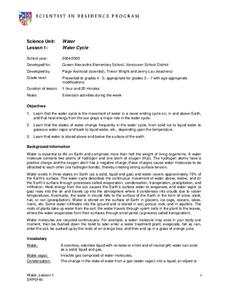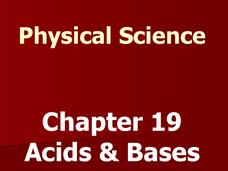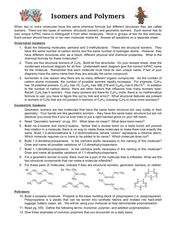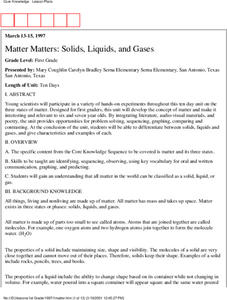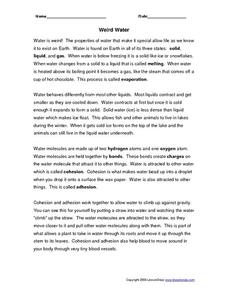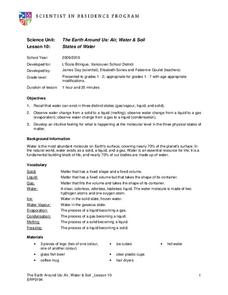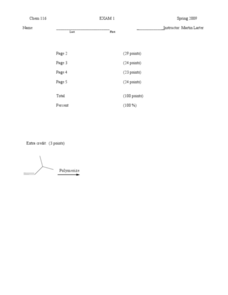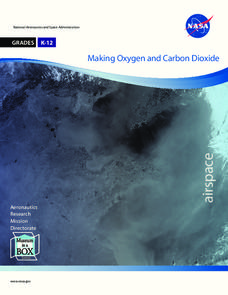Curated OER
Nuclear Magnetic Resonance
Eleven slides are used in this PowerPoint to present how nuclear magnetic resonance works and to give learners an opportunity to interpret examples of nuclear magnetic resonance spectra. Ample information is provided, so this is a...
Curated OER
Water Cycle
Young scientists explore Earth elements by conducting an experiment. They define water vocabulary terms such as condensation and precipitation. In addition, they conduct a water experiment in which they build a terrarium, so they can...
Mr. E. Science
Acids, Bases and Solutions
If you are not part of the solution, then you are part of the precipitate. The presentation covers solutions, suspensions, solubility, dissociation, and acid/base reactions. This is the 19th lesson in a series of 26.
Curated OER
Making Molecular Models
In these creative hands-on activities, students construct several different molecular models that represent substances that play an essential role in our nutritional needs. Using gum drops and toothpicks, students design the models....
Curated OER
Surface Water and Groundwater
Students examine distribution of water and minerals. In this surface and groundwater instructional activity, students conduct an experiment with fresh and salt water making hypothesis and drawing conclusions about minerals.
Curated OER
Isomers and Polymers
Students create models of structural isomers, geometric isomers, and polymers. In this chemistry lesson, students are given definitions and molecular model kits to create a variety of different isomers and polymers.
Curated OER
AP Chemistry Atomic Structure-7 Worksheet
In this atomic structure worksheet, learners solve twelve problems related to wavelength, frequency, electron transitions, emission spectra and quantum number.
Curated OER
Combustion Analysis Worksheet
In this combustion worksheet, students are given directions as to how to analyze a combustion reaction and they then solve five problems using this process.
Curated OER
Physical vs. Chemical Changes
In this chemical and physical change worksheet, students are given details about chemical and physical changes. They are given 2 examples using water and salt and they identify 15 statements as chemical or physical changes. Students...
Curated OER
Matter Matters: Solids, Liquids and Gases
Scientists participate in a variety of hands-on experiments in this ten-day unit on the three states of matter. Lessons incorporate literature, a-v materials, and poetry to help students differentiate between solids, liquids and gases.
Curated OER
Empirical Formulas
In this empirical formulas worksheet, students read about determining empirical formulas from chemical formulas. They determine the empirical formula given ten molecular formulas. They also find the molecular formulas given the mass and...
Curated OER
Water Cycle Activity
Students build a model and observe the cycle of evaporation and condensation that occurs in the water cycle. They see how the water cycle works, such as water condensing on the side of the jar and drops precipitating into rain that...
Curated OER
Plastics by the Numbers
Students investigate plastic resins and their uses. In this plastics lesson plan, students describe major plastic resins and what they are used for, they compare and contrast the properties of plastic resins and they list products that...
Curated OER
Weird Water
In this weird water worksheet, students read for information and assess comprehension. In this true and false, fill in the blank, and multiple choice worksheet, students answer ten questions.
Curated OER
Carbohydrates and Fats Crossword
In this carbohydrates and fats worksheet, students complete a crossword puzzle by figuring out the vocabulary words associated with 19 clues given.
Curated OER
States of Water
Young scholars investigate the 3 states of matter. In this physical science "matter" lesson, students observe and participate in a number of demonstrations involving melting and freezing water. Young scholars observe the effect heat has...
Curated OER
Energy and Energy Resources
In this energy and energy resources worksheet, students complete 14 fill in the blank questions in the form of word scrambles, twisters, and teasers.
Texas State Energy Conservation Office
Investigation: Chemical Models
Science teams make models of four different hydrocarbon compounds that we commonly use for fuel. Then they demonstrate chemical reactions that result when energy is produced. This can be used as an enrichment when your class is studying...
Biology Junction
Water Properties and More
Did you know many insects use cohesion or surface tension to walk on water? Using a presentation, scholars learn the more important properties of water. It extends into the concepts of solutions, suspensions, pH, and more.
Curated OER
Chemistry 116 Exam 1, Spring 2009
This five-page exam was designed for a biochemistry and organic chemistry course. It covers the molecular geometry and properties of organic comounds. Test takers identify compounds, functional groups, and isomers. They draw Lewis...
NASA
Making Oxygen and Carbon Dioxide
Some like it hot! Scholars observe both exothermic and endothermic reactions as part of the carbon dioxide oxygen cycle. First, scientists demonstrate (or watch) a chemical reaction to create pure oxygen using fire for...
Curated OER
Parts Per Hundred (ppH)
For this parts per hundred worksheet, students read about describing components of a population by parts per a given number such as 100, 100 or 1 million. Students are given 6 problems to calculate the parts per hundred for each sample...
Curated OER
Relative Mass Formula, Atomic Formula, and Empirical Formula
After giving the definitions of the different compound terms and formulas, equations are provided to teach your chemists to calculate different values. Relative formula mass, atomic mass, and empirical mass are shown and explained with...
National Institute of Open Schooling
Electrochemistry
In an electrolytic cell, electrical energy is converted into chemical energy, the exact opposite of a battery! Lesson 15 in a series of 36 explores electrochemistry. Participants begin by reading and discussing oxidation/reduction...



